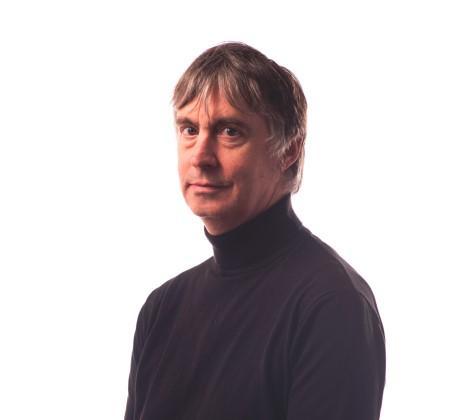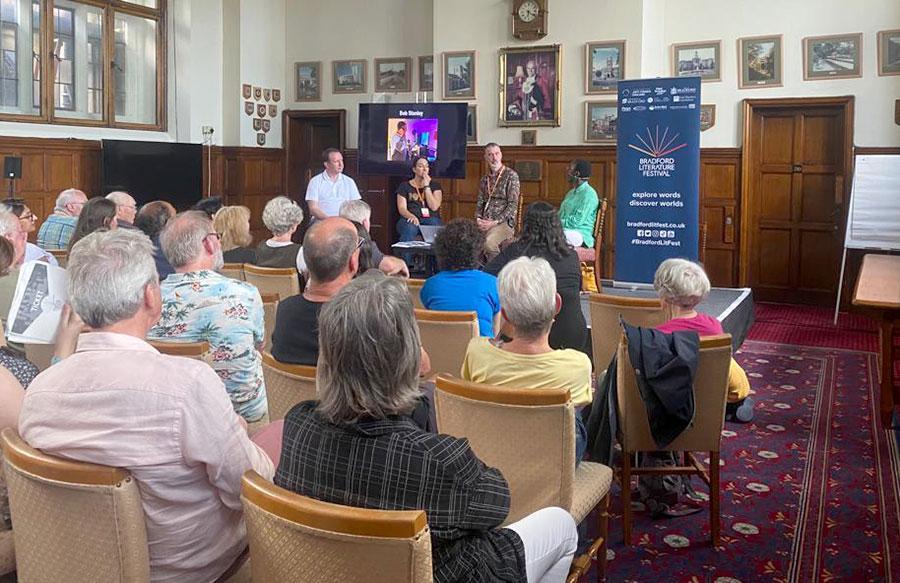Academic Profile - Dr Mark Goodall
Investigating culture through film, music and sound
Dr Mark Goodall is an Associate Professor in the Department of Media, Design and Technology at the University of Bradford. He was part of a team from the University who created the New Postscripts project for the BBC’s 100th anniversary, which was an update of JB Priestley’s radio broadcasts on the BBC during WW2. He recently hosted a session at the Bradford Literature Festival about the New Postscripts, and here he talks about this event and his research career so far...
Can you tell us about the event you hosted at the Bradford Literature Festival?
For the session at the Bradford Literature Festival, I introduced the original Priestley postscripts and explained what those were, including an audio clip of Priestley’s first postscript recording about Dunkirk and then explained our project. We played a selection of the New Postscripts in their entirety (around five minutes each), and I was worried that people might get uncomfortable listening to audio clips of that length, but people engaged with it. Some people were quite moved, because of the personal nature of the stories and how radio can be a very intimate way of communicating.

Dr Mark Goodall
Three of the people involved, Saima Mir, Furaha Mussanzi and Bob Stanley were also on stage with me, and I asked them a few questions about how they found the experience, their positives and negatives and what they learned from it. This was followed by a Q&A which was quite lively, but overall, I think people really understood and made the connection between the original Postscripts, which described everyday life despite the conflict and turmoil of World War Two in the background, and the New Postscripts that reflect the diverse culture of life in the 21st Century.
The event was really positive and pretty much sold out, which I was pleasantly surprised at - it was one of a series of JB Priestley-themed events at the Literature Festival, so maybe it just captured the right audience.

The Bradford Literature Festival event 'J.B. Priestley’s Postscripts Revealed' in June 2023, hosted by Mark Goodall
Can you give us an overview of your research career so far?
In terms of my own research, the core areas of my research are film, and music and sound.
My first degree was in art and design and was interested in making video art, then I got into the academic side of culture and decided to focus on film history. I discovered these weird Italian films from the 1960s that were shock documentaries, known as Mondo films, that are full of bizarre clips from all around the world collaged together in surprising ways. I realised no one else had written anything about them, so I wrote a book about them for a small an independent publisher who specialised in cult, underground subjects.
This became my PhD subject, and since then there's always been this two-track thing where I’ve balanced academic research in journals with more commercial publications. For example, last year an American DVD company that are bringing out some Mondo films interviewed me for the DVD extras – they're talking to me as an academic from the University of Bradford, but this will be on a commercial DVD that's going to be released around the world as entertainment.
I’ve also made music since I was young, and teaching on the media courses at Bradford has incorporated my interest in sound. I have a short attention span and jump around between different things, but recently I've gone back to the beginning to where I started as an art student making weird experimental films and now making ‘proper’ films again.
There’s elements of film, sound, art and culture within my research, and I enjoy the fact that I can both talk about it academically, and also make it accessible to a broader audience.
And can you identify particular achievements and milestones from your career so far?
As mentioned above, being recognised as a leading expert in Mondo films is something I’m proud of and has given me the opportunity to speak in Paris and across the world.
Working as a consultant for the Bradford Film Festival during their most successful period, that's another high point because that was about bringing filmmakers to the festival and interviewing them on stage, screening their retrospectives, and being the face of that was a great experience which also helped promote the university.
And the New Postscripts was a significant moment for me because it's an AHRC-funded project collaborating with the BBC, so I think it's a turning point for me that shows I can attract funding, which hopefully bodes well for future projects.
I’ve written a number of books, including The Beatles or ‘The White Album’ and Gathering of the Tribe: Music and Heavy Conscious Creation. I’ve also written a number of articles for The Conversation.
Can you tell us about the Culture and identity research group you're involved with?
Karina Croucher and I decided to form this group with the idea of identifying research related to arts, music, dance, film, literature, poetry, drama, and identity from all the corners of the university. Identity was a catch-all term for exploring people's differences, and how interesting it is that everyone presents themselves in their own way.
We’re still in the process of finding out what Bradford does in relation to culture and identity, but the university has recognised our group as a good place to start in terms of its preparations for City of Culture 2025 events. We've had some internal funding to support five seed fund projects related to City of Culture 2025 and I think will there be some really interesting collaborations with artists outside of the university with the potential to develop further. I think we'll be able to play a really important role in the debate about what the university can, and should, contribute to City of Culture, and do something great.
